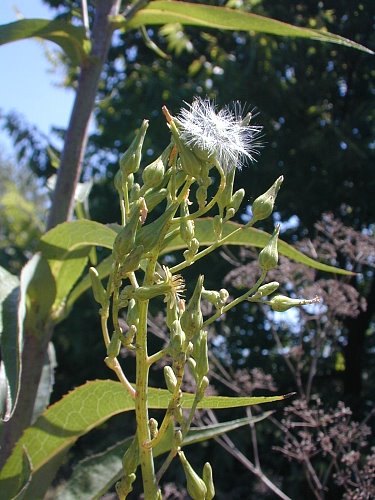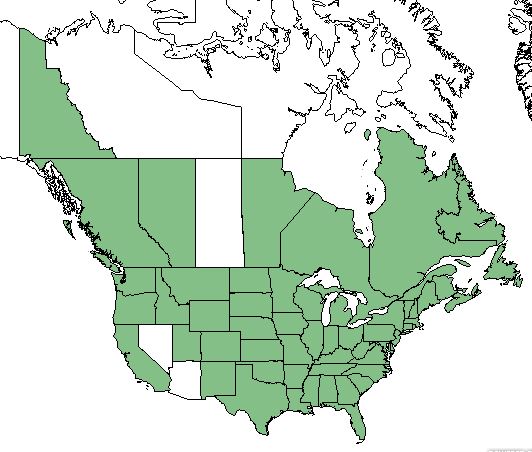Difference between revisions of "Lactuca canadensis"
(→Ecology) |
|||
| Line 40: | Line 40: | ||
===Use by animals=== <!--Herbivory, granivory, insect hosting, etc.--> | ===Use by animals=== <!--Herbivory, granivory, insect hosting, etc.--> | ||
| − | In Minnesota, | + | In Minnesota, browsing by white-tailed deer (''Odocoileus virginianus'') reduced the height (63.8 cm with browsing versus 136.9 cm without). Also, flowering was over 7 times greater on unbrowsed (231 flower heads per plant with browsing versus 1,725 without) ''L. canadensis'' plants.<ref name="Shelton & Inouye 1995">Shelton AL, Inouye RS (1995) Effect of browsing by deer on the growth and reproductive success of ''Lactuca canadensis'' (Asteraceae). The American Midland Naturalist 134(2):332-339.</ref> |
<!--==Diseases and parasites==--> | <!--==Diseases and parasites==--> | ||
Revision as of 13:32, 31 January 2018
| Lactuca canadensis | |
|---|---|

| |
| Photo by the Illinois Wildflowers Database | |
| Scientific classification | |
| Kingdom: | Plantae |
| Division: | Magnoliophyta - Flowering plants |
| Class: | Magnoliopsida - Dicots |
| Order: | Asterales |
| Family: | Asteraceae |
| Genus: | Lactuca |
| Species: | L. canadensis |
| Binomial name | |
| Lactuca canadensis L. | |

| |
| Natural range of Lactuca canadensis from USDA NRCS Plants Database. | |
Common Name: American wild lettuce;[1] Canada lettuce[2]
Contents
Taxonomic Notes
Synonym: L. sagittifolia;[1][2] L. steelei[2]
Description
Lactuca canadensis is a dioecious annual and biennial that grows as a forb/herb.[2] Its inflorescence consist of a cluster of small pale yellow flowers. When crushed, its foliage excretes a milky juice. Leaves are alternate, simple, with lobed margins. It is relatively short, reaching heights of 0-1 ft (0.0-0.3 m).[3]
Distribution
This species occurs in all of the lower 48 United States excluding Nevada and Arizona. In Canada, it is found in all the provinces except Saskatchewan, Nunavut, and Northwest Territories.[2]
Ecology
Habitat
L. canadensis is found in fields, roadsides, disturbed ground,[1] thickets, forest edges, and in forest clearings (as cited in [4])
Phenology
In the southeastern and mid-Atlantic United States, this species flowers from June through November.[1] Flowers on the Florida panhandle have been reported in May, June, and August, peaking in June.[5]
Use by animals
In Minnesota, browsing by white-tailed deer (Odocoileus virginianus) reduced the height (63.8 cm with browsing versus 136.9 cm without). Also, flowering was over 7 times greater on unbrowsed (231 flower heads per plant with browsing versus 1,725 without) L. canadensis plants.[6]
Conservation and Management
Cultivation and restoration
Photo Gallery
References and notes
- ↑ 1.0 1.1 1.2 1.3 Weakley AS (2015) Flora of the Southern and Mid-Atlantic States. Chapel Hill, NC: University of North Carolina Herbarium.
- ↑ 2.0 2.1 2.2 2.3 2.4 USDA NRCS (2016) The PLANTS Database (http://plants.usda.gov, 30 January 2018). National Plant Data Team, Greensboro, NC 27401-4901 USA.
- ↑ Plant database: Lactuca canadensis. (30 January 2018) Lady Bird Johnson Wildflower Center. URL: https://www.wildflower.org/plants/result.php?id_plant=LACA
- ↑ Lebeda A, Dolezalova I, Ferakova V, Astley D (2004) Geographical distribution of wild Lactuca species (Asteraceae, Lactuceae). Botanical Review 70(3):328-356.
- ↑ Nelson G (30 January 2018) PanFlora. Retrieved from gilnelson.com/PanFlora/
- ↑ Shelton AL, Inouye RS (1995) Effect of browsing by deer on the growth and reproductive success of Lactuca canadensis (Asteraceae). The American Midland Naturalist 134(2):332-339.